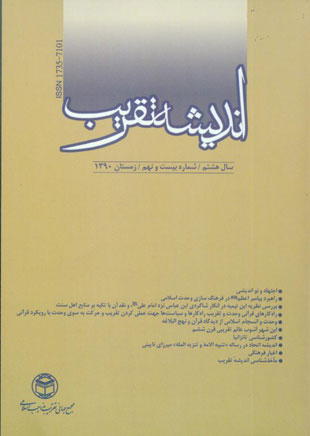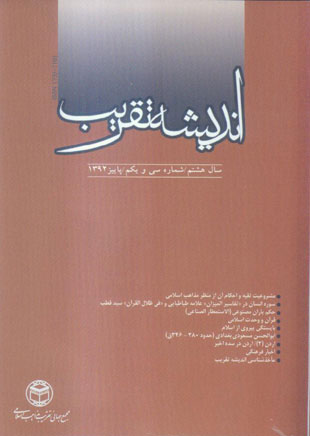فهرست مطالب

فصلنامه اندیشه تقریب
پیاپی 29 (زمستان 1390)
- 200 صفحه، بهای روی جلد: 20,000ريال
- تاریخ انتشار: 1391/04/01
- تعداد عناوین: 14
-
صفحه 5
- مقالات اندیشه ای
-
صفحه 11
- پیشگامان تقریب
-
صفحه 87
- سرزمین های جهان اسلام
-
صفحه 99
- گزارشی از یک کتاب
-
صفحه 137
- ماخذشناسی اندیشه تقریب
-
صفحه 170
-
صفحه 181
-
Page 11Today the fast developments and changes in human's life and occurring of new issues in social life have caused complex juqrisprudencial and legal implications. As a comprehensive, everlasting and universal religion, Islam should respond to such developments. Emphasizing on religions new thinking, the author rejects Liberal Democracy theories and adherence to Islamic principles, but refers to Ijtihad theories which are based on the time and situation, e.g. the theory of Imam Khomeini (r), the council-based Ijtihad (Hashemi Rafsanjani's theory) and its successful application in International Society of Islamic Jurisprudence, and the theory entitled ''Mantaqat Al-Feraq''.
-
Page 17The Prophet (s.a) who was responsible for delivering the teachings of Islam, provided mankind with comprehensive and ethical Islamic teachings including unity of Islamic nations. He delivered this message using social and intellectual capacity of the nations. Consequently, some of the Prophet's strategies were reflected in the form of Islamic culture not so long after He delivered the message. The capacities and specifications of Islamic culture moved His message beyond boundaries and time. Therefore, it was expected that the Islamic culture and Islamic unity, (as one of the elements of Islamic culture), develop and increase equally; however, after demise of the Prophet (s.a) this part of the Islamic culture, like the other parts was neglected. Using analytical-historical method, this paper assesses the issue of Islamic unity in the attitude and behavior of the Prophet (s.a) and explains His major measures for preparing the belief-related, ethical and behavioral groundworks in Islamic culture for Islamic unity. The Prophet's (s.a) major strategies for preparing the culture of Islamic unity were namely, informing people, fighting against extremism and bios behavior, rejecting sectarianism, promoting monotheism as the main axis of unity, presenting common human rights, and applying Islamic ethics.Keywords: the Holy Prophet (s.a), Islamic Unity, strategy, culture, Islam world, the Quran, Traditions
-
Page 33Imam Ali's (a.s) religious authority became one of the issues in Islamic society after demise of the Prophet of Islam (s.a). This issue has been so outstanding that many of Mohadethan, commentators, jurists and historians wrote about it. Imam Ali (a.s) was so prominent that many of the great companions of the Prophet were proud of being student of him, namely Ibn-e Abbas, who was given various titles as ''Habr Al-Aemeh, Bahr, Tarjoman Al-Quran, Rais Al-Mofaserin and Faqih Al-Asr'. He was one of students of Imam Ali (a.s) and considered this fact as an honor. Ibn-e Tamimiye denies the fact that Ibn-e Abbas was Imam Ali's student; whereas, according to Sunni resources, Ibn-e Abbas has stipulated that the origin of his knowledge in exegesis of the Quran was Imam Ali (a.s). Ibn-e Abbas has introduced Imam Ali (a.s) as his best teacher after the Prophet (s.a). Confronting Ahl-e Bayt (a.s) and intending to weaken the position of Imam Ali's religious authority and promoting such authority for others, Ibn-e Tamimiye constantly attempted to ignore or justify several of the indisputable historical realities. His viewpoints regarding denial of Ibn-e Abbas's studentship with Imam Ali (a.s) is not acceptable due to the historical facts and the issue requires assessment.Keywords: Imam Ali's religious authority, Imam Ali (a.s), Ibn, e Abbas, Ibn, e Tamimiye, Sunni
-
Page 47Having explanatory-analytical approach, the present paper explains that there are practical and clear academic, cultural, political and economic ways for establishing proximity and cohesion among Islamic sects. It is hoped that through establishing such cohesion, great steps are taken in unity of Muslims. It should be mentioned that by Islamic sects we mean jurisprudence-based Islamic religions which refer to the Quran and traditions as their main sources of reference, i.e. Shafei, Hanafi, Maleki, Hanbali and the Sunni ones as: Zeidi, Ethna Ashari, and Abazi.Keywords: ways of proximity, Islamic sects, unity covenant, Islamic awakening, Islamic nations union, leadership unity
-
Page 71The present paper assesses terminology of ''unity and solidarity'' and then analyses various types of unity according to the Quran and Nahj Al-Balaqa. According to sociology, unity in religion is divided into three types: first, unity in societies, second, unity in the field of Ibrahimic religions, and third, Islamic unity. This paper intends to study Islamic unity. In Islamic unity, the author deals with the principles and major factors of unity; such as monotheism, Islam, the Quran, the Prophet of Islam (s.a), love of Ahl-e Bayt (a.s), Islamic brotherhood, Muslim's Qiblah and Hajj pilgrimage. Also the paper assesses major ways for achieving Islamic unity; e.g. boosting commonalities, tolerating other's belief, critiquing without disrespecting, academic exchange between Muslim scholars, refraining from fanaticism, promoting Islamic unity, and having good will for each other. Such issues are assessed based on the teachings of the Quran and Nahj Al-Balaqa. Other issues assessed in this paper based on the Quran and Nahj Al-Balaqa include the outcome of Islamic unity such as security, dignity, religious power, national solidarity and honor, growth of Islamic society, and increase in divine blessings.Keywords: Unity, Islamic solidarity, the Quran, Nahj Al Balaqa, major parts of unity, outcome of Islamic unity
-
Page 87The main idea behind this paper is to present attitudes and behavior of Ibn Shahr Ashub who had a good relationship with the Sunnies. As a great scholar of the 6th century, Ibn Shahr Ashub, based on hismoderate and reasoning attitude, had a moderate and compromising relationship with the Sunnies. He would enter into Sunni societies without any fear and he would learn from anyone who could teach him. Accordingly, in the Rejal and Hadith sciences, whenever he made certain about a tradition quoted by a Sunni scholar, he would refer to such tradition. He had the same approach in other sciences, e.g. in the Quran and exegesis of the Quran and particularly in Jurisprudence and Principles of Islamic Laws. Interestingly, Ibn Shahr Ashub had a compromising approach even in Theology which is known to be different from other Islamic sciences. In his famous book,entitled, ''Manaqeb Ale Abi Talib'' he would refer to authenticated Sunni traditions as the main sources for explaining about virtues of the Ahl-e Bayt (a.s). His attitudes and behavior particularly concerning scientific issues was such that the Sunni scholars had great respect for him and some of the Sunni scholars said great and inspiring things about his open-mindedness.Keywords: Ibn Shahr Ashub, relationship, the Sunnies, the Shiite
-
Page 99Tanzania is one of the major countries within African continent. The capital is Dar Al-Salam which is one of the main ports of Africa. One third of the population is Muslim. According to statistics, most of the people live in rural areas and do agriculture. There are several races living in the country. The official language is Swahili which is considered as an elements causing national unity. The constitution was implemented in 1965. The constitution is divided into the three sections as the legislative, the judiciary, and the administrative. There are different religions in the country, e.g. Muslims, and Christians, including Orthodox, Protestant, Tangagiga Muslims, and Bakulta Muslims. The country has the highest ranks in terms of literacy within Africa and about 85 per cent of the nation is literate. Since the majority of people live in rural areas, the economy is based on agriculture and the country exports agricultural products, such as tea, tobacco, coffee, and cocoanuts. This paper intends to assess geographical situation, population, political history, constitution, national divisions, religions and sects,culture, economy and international policy of Tanzania.Keywords: Africa, Tanzania, Dar Al Salam, Bakowata, Balukta, Swahili language
-
Page 125Mirzaye Naini was one of the open-minded scholars who played a major role against tyranny and colonial regime and helped start of constitutionalism and awakening of Muslims. In his book entitled, ''Tanbih Al-Ommah Wa Tanzih Al-melah'' which is about political jurisprudence, he explains the theory of constitutionalism and democracy and law. He elaborates on the political system accepted by Islam and answers relevant questions. The book mostly deals with constitution and ruling issues. One of the issues which has not been studied about his book is Islamic unity. Mirzaye Naini has invited Muslims towards unity through differentMethodsfirst, scientific simultaneity and respecting differences in viewpoints; second, learning about world's Muslims and being sensitive about them; third, considering discords and disagreements as the tool used by autarky; fourth, suggesting methods as solutions to the quesion.Keywords: Mirzaye Naini, Tanbih Al Ommah Wa Tanzih Almelah, disagreements, Islamic unity, methods


